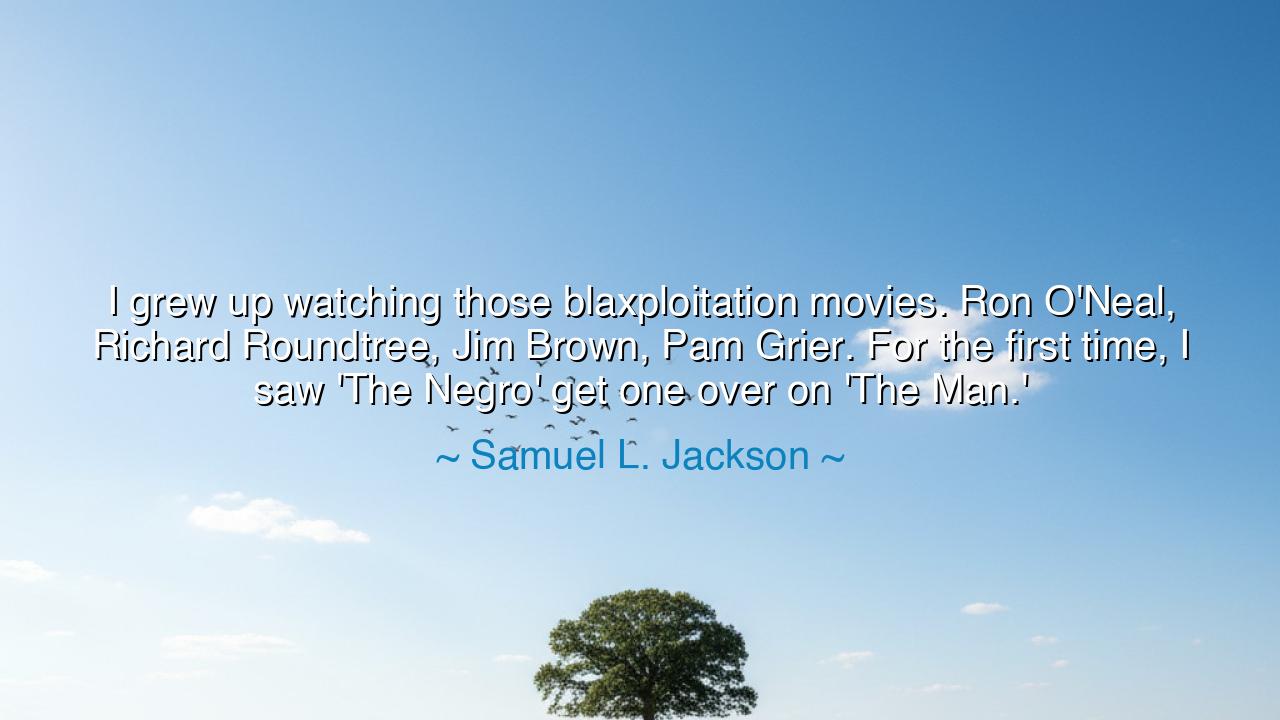
I grew up watching those blaxploitation movies. Ron O'Neal
I grew up watching those blaxploitation movies. Ron O'Neal, Richard Roundtree, Jim Brown, Pam Grier. For the first time, I saw 'The Negro' get one over on 'The Man.'






Gather close, O seekers of wisdom, for I bring forth a reflection on the power of representation, resilience, and the fight for justice. In the tapestry of human history, there are moments when art and culture reflect the struggles and triumphs of the oppressed. These are the stories that resonate deeply, not only in the time they are created, but for generations to come. Samuel L. Jackson, a great actor and voice of his generation, once shared a deeply personal truth: "I grew up watching those blaxploitation movies. Ron O'Neal, Richard Roundtree, Jim Brown, Pam Grier. For the first time, I saw 'The Negro' get one over on 'The Man.'" In these words, Jackson reveals the profound impact of a genre of film that brought forth a new era of empowerment for Black America and the world.
The blaxploitation genre, born in the 1970s, was a bold and defiant response to the racial injustices of the time. For too long, Black characters had been relegated to roles of subservience, silence, and oppression in Hollywood films. But with the advent of blaxploitation, figures like Ron O'Neal, Richard Roundtree, Jim Brown, and Pam Grier took center stage. These actors became the heroes, the warriors, the ones who stood up against the corrupt powers of society, flipping the narrative to show Black characters triumphing over the very systems that sought to keep them down. For Jackson, these films were not just a form of entertainment; they were a revelation, a powerful symbol of resilience, and a sign that even in the face of oppression, there was the potential for victory.
Consider the struggle of Harriet Tubman, a woman who faced the slavery of her time and fought not just for freedom, but for the dignity of her people. Tubman’s story is one of empowerment in the face of unimaginable odds, much like the characters in the blaxploitation films who fought back against the corrupt systems around them. Tubman did not bow to the forces that sought to oppress her; instead, she became a symbol of defiance, leading others to freedom on the Underground Railroad. She, like the heroes of blaxploitation, stood as a beacon of what is possible when we refuse to accept our circumstances and decide, instead, to claim our power.
In Jackson’s words, we hear the echo of a world that had long denied the Black community its rightful place in the narrative of history. The blaxploitation films gave voice to the Black experience, telling stories that were rarely seen in mainstream cinema. They presented Black heroes who were not victims, but individuals who took control of their destiny, whether through bravery, wit, or strength. Jackson's statement reflects not just admiration for these films, but a recognition of how they changed the cultural landscape, offering Black Americans a reflection of their own power, not as subjugated beings, but as agents of change.
As the blaxploitation era grew, so did its significance. Characters like Shaft, played by Richard Roundtree, became icons—symbols of defiance and strength in a world that sought to break them down. Roundtree’s portrayal of John Shaft, a tough private detective, was not just an image of masculinity, but a symbol of empowerment for an entire community. Just as Jackson recognized his own journey through those films, so too did countless others see in these characters a reflection of their own struggle for justice, equality, and dignity.
This lesson, O children of wisdom, is clear: representation matters. The stories we tell—whether through film, art, or any other medium—hold the power to shape society and inspire generations to come. Just as Jackson was shaped by the blaxploitation films, so too can the stories we create today shape the future. These films may have been seen as entertainment, but in their defiance, in their portrayal of Black strength, they became a tool of resistance. They gave voice to the silenced, power to the powerless, and hope to the oppressed.
In your own life, remember the power of storytelling. Whether you create, consume, or share, understand that the stories we tell shape the very fabric of our world. Do not shy away from telling stories that challenge the status quo, that lift the oppressed, that speak truth to power. Like the heroes of blaxploitation films, dare to stand against the forces that seek to diminish you, and remember that in the telling of your story lies the potential for transformation. Just as Shaft walked with pride, so too must you walk with confidence, knowing that you hold the power to shape the world through the stories you tell.






AAdministratorAdministrator
Welcome, honored guests. Please leave a comment, we will respond soon